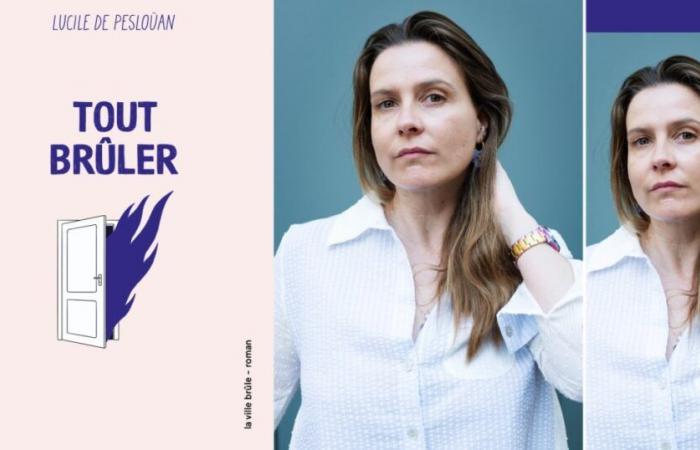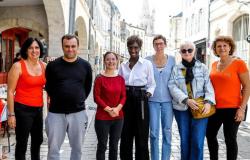
Lucile de Pesloüan’s novel is about a hundred pages long. Within these, free verses depict a form of anger: that of the incest experienced by her heroine, Stella. And that of the incest experienced by the writer herself.
The feminist author – who before that wrote many beautiful children’s books – did not want “to deliver a testimony but to create a literary object”, she confided to us, on the other side of the wire. Published on September 6, 2024, Burn everythingwritten in verse, is “a seizure of power”, a flood of anger and a bonfire. Interview.
“Burn everything”, the anger of Lucile de Pesloüan
Marie Claire : When did you start writing this book?
Lucile de Pesloüan: Two and a half years ago, I was working on a novel, inspired by my personal experience, about the family breakdown between parents and children in adulthood. The narrator was doing a kind of narrative investigation, a family investigation, to try to understand how the bonds could have broken. And unfortunately or fortunately, reality caught up with fiction.
During my investigation, I realized that I had been, as a child, a victim of incest by my father and my brother. And that my father had also, for several years, assaulted two of my cousins. I then completely stopped writing this novel because I understood that I had another story to tell.
When I reported the incest, my family tried to stop me from talking and even blackmailed me.
What does this title mean to you? Burn everything ?
I chose this title at the end of writing, because I realized that fire was a kind of common thread. “To burn everything” is really the expression of anger: to set fire and wipe the slate clean of the past. It is also the fact of transcending oneself into something else. To be after the ashes.
Why did you choose to write in verse form?
I really like free verse. I find it a very pleasant form to read. Saving words, finding the right sentence, the right rhythm. It seemed to me that to hear Stella’s story, you really had to weigh the words.
I didn’t want to drown the reader in details. I wanted him to be able to read between the lines. Not to minimize the facts, but to give breathing space. Not to say everything in order to see better.
Read also
“A Family” by Christine Angot: the silence of the Angots in the face of incest
The Impossible Healing After Incest
Would you say that writing this novel was therapeutic for you?
It was an outlet, but I wouldn’t say it was therapeutic. I see a psychiatrist regularly, and for me, that’s the real therapy. Writing has always been my way of expressing myself. When I denounced the incest, my family tried to stop me from talking and even blackmailed me.
For me, writing this book is really about speaking out, taking my place and expressing my anger. No one can prevent the publication of this book. Which represents for me a taking of a position, of power.
My complaint was dismissed after six weeks. The accused perpetrators were not summoned. They don’t even know that I filed a complaint.
Is this a way of paying tribute to the little girl you were?
Certainly. It is a very strong emancipation. I tell him: “You were right to hang on and not let go.”
When I filed a complaint [en mai 2023, contre son père et son frère, ndlr]the juvenile police officer asked me if I had kept a diary as a child. I never wrote about what happened, but I wrote about suicide when I was 12.
My parents once forced me to tear up several of my journals because they had read them. This book is also a tribute to the little girl who was brutalized for writing.
In your novel, you also mention the violence that can result from filing a complaint.
My complaint was dismissed after six weeks. The accused perpetrators were not summoned. They don’t even know that I filed a complaint. There was no investigation. This is extremely frustrating and abnormal.
Your heroine explains that with 20,000 euros, she saved her skin. Is it important for you to remember that behind incestuous violence, there is a real cost?
Yet another injustice: the victims have to bear the brunt of everything. The health costs, but also the consequences of incest in their daily lives, chronic fatigue, depression, eating disorders, etc.
I try to enjoy the moments when I’m doing well but I have PTSD and I don’t know if it will ever be completely cured.
You write that “incest crushes everything in its path: trust, security, sexuality, power relations, family ties, the relationship to the body, self-image…”. Can we ever recover from this trauma?
I don’t feel like it. In the best case, you learn to live with it. I’m 41, still have years to live, but I’m still hyper-vigilant. I try to enjoy the moments when I’m doing well but I have post-traumatic stress disorder. [troubles psychiatriques qui surviennent après un événement traumatisant, ndlr] and I don’t know if he will ever be completely cured.
Read also
Incest: the trigger that allowed Héloïse Martin to speak about the sexual violence her uncle subjected her to
Exclusion after the liberation of speech
Your heroine expresses the loneliness that incest has plunged her into. She says she lost many friends and became “toxic.” What does that mean?
I’ve read a lot of books about incest and often the stories describe the abuse, or what happens when the victim becomes aware of it and speaks out. It’s full of hope.
For me, it was the opposite when I spoke out. I experienced it as a second aggression. My family resented me and I was excluded by almost everyone.
Others close to me also distanced themselves. Incest had almost become an obsession for me, and they didn’t want to talk about it. I needed someone to listen to me, to tell me “I’m here for you”, but people can’t say it. Incest is sordid and very scary.
Let’s protect children. Let’s protect them instead of teaching them to protect themselves from adults.
Do you hope your loved ones will read your book?
I gave it to a cousin of my mother, who is the brother of the two women who were incestuous with his own brother. I had him read it and he really liked it. It was nice to be able to give it to him. It was nice.
I would also like all my family members who no longer speak to me to read it. I would like them to be confronted with this reality.
What message do you want to convey through this book?
The watchword and the message is: let’s protect children. Let’s protect them instead of teaching them to protect themselves from adults. Even if, obviously, we have to talk to them about consent, tell them that their body is theirs.
Burn Everything by Lucile de Pesloüan, published by La Ville Brûle, 144 pages, currently in the running for the 2024 Fnac novel prize.
If you are a victim of incest:
0805 802 804, freephone number, line open between 10 a.m. and 7 p.m.
0800 100 811, freephone number adapted to overseas opening hours
Read also
Incest: Why do many parents protect the aggressor rather than the victim?





